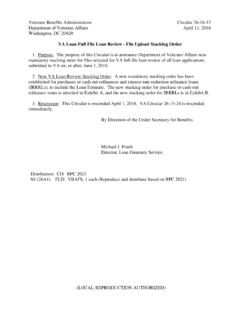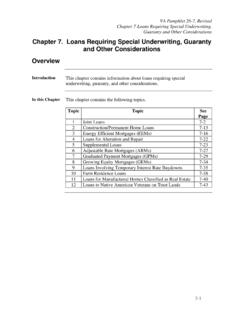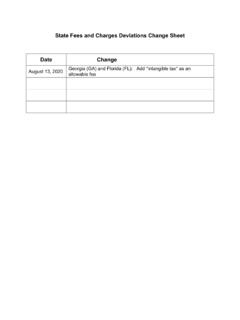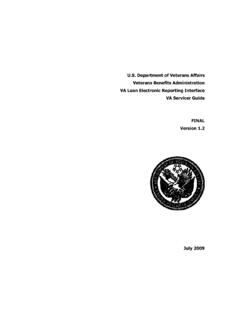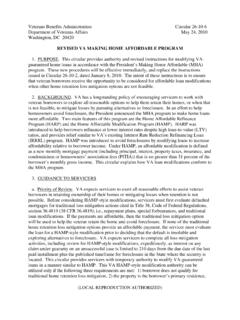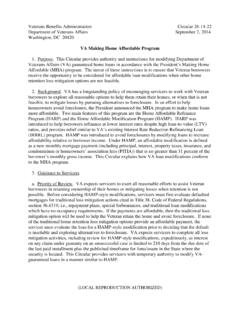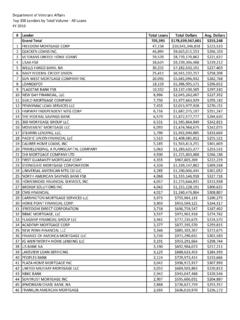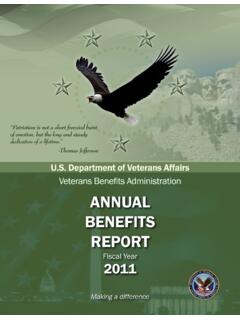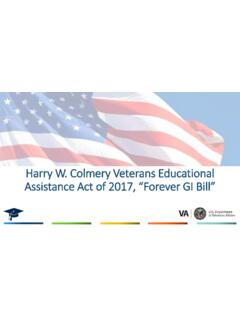Transcription of Impact of CARES Act Forbearance on VA Purchase and ...
1 (LOCAL REPRODUCTION AUTHORIZED) Veterans Benefits Administration Circular 26-20-25 Department of Veterans Affairs June 30, 2020 Washington DC Impact of CARES Act Forbearance on VA Purchase and Refinance Transactions 1. Purpose. This Circular provides guidance applicable to cases where: a. A lender receives a Veteran s application for a Department of Veteran Affairs (VA)-guaranteed Purchase , Cash-out Refinance, or Interest Rate Reduction Refinance loan (IRRRL) loan ; and b. The COVID-19 crisis has caused a Veteran to invoke Forbearance protections afforded by the Coronavirus Aid, Relief, and Economic Security ( CARES ) Act for government guaranteed mortgage debt loan (ex. VA, Federal Housing Administration (FHA), United States Department of Agriculture (USDA)) or loans that fall under Federal Housing Finance Agency (FHFA); or c. Borrowers have invoked Forbearance protections as a result of the COVID-19 crisis, not addressed under the protection of the CARES Act for non-government guaranteed mortgage debt (ex.)
2 Portfolio loans held by lenders). 2. Background. On March 13, 2020, the President declared a National Emergency due to COVID-19. Thereafter, on March 27, 2020, the President signed the CARES Act into law. See Public Law 116-136. Under section 4022 of the CARES Act, a borrower with a Federally backed mortgage loan who is experiencing a financial hardship due, directly or indirectly, to the COVID-19 emergency may request a Forbearance on such loan . A borrower can obtain Forbearance by (i) submitting a request to the borrower s servicer and (ii) affirming that the borrower is experiencing a financial hardship during the COVID-19 emergency. The Forbearance must be granted for up to 180 days and must be extended for an additional period of up to 180 days at the request of the borrower. Forbearance must be offered upon the borrower s request, regardless of delinquency status. On May 19, 2020, the President issued Executive order 13924, instructing agencies to find ways to identify regulatory standards that may inhibit economic recovery and consider taking appropriate action, consistent with applicable laws, to temporarily rescind, modify, waive, or exempt persons or entities from those requirements.
3 See Executive order 13924, Regulatory Relief to Support Economic Recovery. See 81 Fed. Reg. 31353. 3. Effective Dates. This Circular is effective immediately and applied to any loan closed on or the day after this Circular is signed. The policies outlined in this Circular will remain in place until further notice or the Circular is rescinded. 4. Action. Lenders should continue to follow all applicable authorities, including VA s statutes, regulations, and policies ( , policies outlined in VA Pamphlet 26-7, Lender s Handbook), using good judgment and flexibility in originating VA-guaranteed loans for Veterans who invoke CARES Act forbearances. However, due to the economic hardships Circular 26-20-25 June 30, 2020 2 caused by COVID-19, VA is temporarily waiving certain regulatory and policy requirements in an effort to help Veterans and the private sector close essential housing loans.
4 5. VA-guaranteed Purchase and Cash-out Refinance Loans. Veterans who are affected by COVID-19 should still be afforded the opportunity to utilize their earned VA home loan benefits. For this reason, VA is temporarily relaxing certain credit underwriting policies for VA-guaranteed Purchase and cash-out refinance loans. While lenders must continue to follow VA s underwriting standards generally, lenders should not use a CARES Act Forbearance as a reason to deny a Veteran a VA-guaranteed loan . In such cases, borrowers, through the lender, must provide reasons for the loan deficiency and information to establish that the cause of the delinquency has been corrected. See 38 , ; VA Pamphlet 26-7; and VA Circulars 26-20-10, Lender Guidance for Borrowers Affected by COVID-19, 26-20-19, Additional Lender Guidance Concerning COVID-19, and VA Circular 26-20-13, Valuation Practices during COVID-19, including future policy updates that would supersede Circulars listed above.
5 VA will not consider a Veteran as an unsatisfactory credit risk, based solely upon the fact that the Veteran received some type of credit Forbearance or experienced some type of deferred payment during the COVID-19 national emergency. VA reminds lenders instead to continue to review and evaluate all applicable credit qualifying information, , residual income, debt-to-income ratios, credit, and assets. Although deferred payments may not be considered for credit risk purposes, the lender should consider the monthly obligation if the debt remains active after closing the new loan . 6. IRRRLs. Normally, VA s regulation found at 38 (a)(5) requires lenders to obtain prior approval from VA if the loan being refinanced is delinquent, , the scheduled monthly payment of principal and interest is more than 30 days past due. In such cases, borrowers, through the lender, must provide reasons for the loan deficiency, information to establish that the cause of the delinquency has been corrected, and information establishing that the borrower qualifies for the loan under VA s underwriting and credit standards found at 38 (c) through (j).
6 Under this Circular, VA is temporarily waiving certain prior approval requirements applicable to delinquent loans. a. Waiver of Prior Approval. Under this Circular, VA s prior approval is not required, regardless of delinquency status, if (1) VA has already approved the lender to close loans on an automatic basis, (2) The borrower has invoked a CARES Act Forbearance relating to the loan being refinanced, (3) The borrower has provided information to establish that the borrower is no longer experiencing a financial hardship caused by COVID-19, and (4) The borrower qualifies for the IRRRL under the credit standards set forth by 38 (c) through (j). June 30, 2020 Circular 26-20-25 3 b. IRRRLs Where the loan Being Refinanced Is Not More Than 30 Days Past Due. As explained above, VA s regulations require prior approval and underwriting for an IRRRL only when the loan being refinanced is more than 30 days past due.
7 If the loan being refinanced is not more than 30 days past due, VA s approval is not required in advance of the loan , nor is underwriting required. Thus, VA s prior approval and lender underwriting are not required in cases where the loan being refinanced is overdue by 30 days or less, regardless of whether the Veteran requested a CARES Act Forbearance and the delinquency status at the time of such request. c. Maximum loan Amount. In general, lenders should continue to follow VA s regulation found at 38 , to determine the maximum loan amount of an IRRRL. In the context of a CARES Act Forbearance , this means that IRRRLs may include the following: (1) Any past due installment payments, including those a borrower deferred under a CARES Act Forbearance , plus (2) Allowable late charges, consistent with the note, the CARES Act, and all other applicable laws, plus (3) the cost of any energy efficiency improvements, plus (4) Allowable closing costs and discount points, and (5) the VA funding fee.
8 D. loan Seasoning, Fee Recoupment, Discount Points and Net Tangible Benefit Standards. Lenders are reminded that all IRRRLs must meet loan seasoning, fee recoupment, discount points and net tangible benefit requirements, as prescribed by 38 3709 and VA policy guidance. Periods of Forbearance cannot count toward seasoning; however, Forbearance under the CARES Act does not, alone, cause the loan to fail to meet the seasoning standard. If a loan being refinanced met seasoning requirements before a Veteran invoked a CARES Act Forbearance , the seasoning requirement remains satisfied. A loan being refinanced is seasoned if both of the following conditions are met as of the date the borrower closes the refinance loan : (1) The borrower has made at least six consecutive monthly payments on the loan being refinanced. For example, in a case where a borrower made five consecutive payments before invoking a CARES Act Forbearance , such borrower would need to make six additional consecutive payments, post Forbearance , in order to meet the seasoning requirement.
9 (2) The date of closing for the refinance loan is 210 or more days after the first payment due date of the loan being refinanced. e. Valuation. An appraisal is not necessary except in cases where 38 3709(b)(4) requires a lender to demonstrate that the IRRRL satisfies the statute s net tangible benefit standard. Lenders are referred to the valuation circulars referenced in section 5 above noting Circular 26-20-25 June 30, 2020 4 future policy updates would supersede that guidance. Lenders should use their appraisal management and assignment process to complete a property value determination versus ordering a VA appraisal. (Note: VA has recently observed some lenders ordering VA Cash-Out loan Identification Numbers (LINs) to request a VA fee panel appraisal and later contact the Regional loan Center (RLC) to convert that LIN into an IRRRL LIN. VA acknowledges that borrowers needs may change prior to closing which may require a change in loan type, however, lenders should not be using this method to secure VA appraisals for IRRRLs.)
10 F. Fees and Charges for Veterans Affected by COVID-19. VA encourages lenders to carefully consider whether an IRRRL is in the best financial interest of a Veteran. VA strongly supports and encourages the fee waivers that many lenders have adopted, including the waiver of origination fees, discount points, and premium pricing offsets, for Veterans affected by COVID-19. 7. stacking order . VA is clarifying the IRRRL stacking order for loans that are covered by section 6 (a)of this Circular. At the time of requesting evidence of guaranty, and in addition to the documents required by Circular 26-19-19, VA loan Full file loan review file upload stacking order , the lender must upload the following documentation to the Correspondence section of WebLGY as Critical Maintenance Exceptions Document Type: (1) VA Form 26-8497, Request for Verification of Employment, and other verifications of income such as pay stubs and tax returns.
